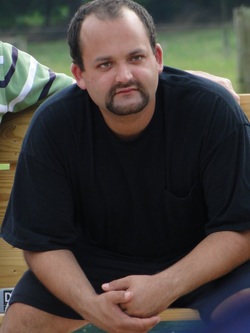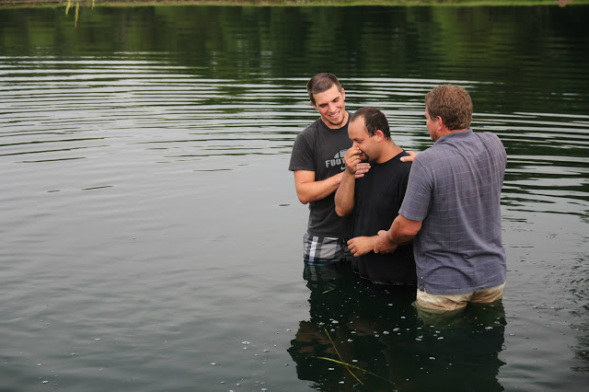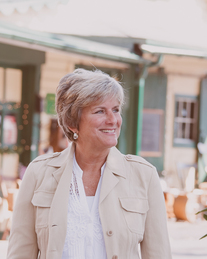
To everything there is a season…. a time to weep and a time to laugh, a time to mourn and a time to dance…Ecclesiastes 3:3-5
David’s adolescence was a particularly difficult time for him and our family. When his uncontrollable behaviors escalated to a level where it simply was no longer safe to have him live at home, we admitted him into a residential treatment facility at the tender age of 10. The daily conflicts had been removed, but the guilt of living apart remained. We knew what people must’ve been thinking, even if they weren’t saying out loud.
How could we commit our own son into the care of others? Why didn’t we try harder to keep him home? The reality was that we did try hard, but we knew David needed much more help than we could give him at home, and we had the welfare of our four other children to consider. David’s violent threats were genuine and intensifying as he grew older. Even so, it required deliberate effort to move past the guilt and shame we felt for placing him.
Good parents don’t give up. Good parents don’t place their children in
institutions. Such was my internal dialogue. These emotional, maternal responses battled daily with my intellectual, learned responses-- the reconciled knowledge that love alone was not going make David well.
His first residential treatment placement ended after two years
when it became clear that David would not likely ever meet their exit criteria. Funding would not be approved to simply continue his treatment and despite our registered reservations, they recommended that he be placed into a therapeutic foster home. We maintained that David had been voluntarily placed in residential treatment precisely because a home setting wasn’t structured enough for him. We expressed our fears that David would regress without stronger support. We knew how exhausting it was caring for him full-time. Even with the (minimal) training they had, therapeutic foster parents were still human and burnout would be inevitable. His caseworker agreed it was not the ideal option, but it was the best they could offer until he could safely return home.
So with nothing else to reasonably consider, David entered the first of three therapeutic foster homes within the next 2 years. Each placement ended abruptly, and for varying (and traumatic) reasons. Through every new transition, David was the biggest loser, and we were left to help pick up the pieces after each move.
Understandably, it only ignited his anger and as his parents, we were frustrated that we could not find a long term, appropriate level of care for him. It was hurtful being judged for not having David at home,
especially because we trying desperately to do the right thing for him.
He needed the structure of each day looking the same as the day before, with clearly defined boundaries, few changes, and the right balance of attention and discipline. With resources and providers quickly vanishing, the pressure to move him back home increased, and when all of our options were finally exhausted, that’s exactly what we did.
During the summer of 2001, David lived at home with us. We were cautiously optimistic that perhaps it might be different this time
around, but in the end it was not. He continued to exhibit many of his trademark behaviors and his anger issues were still dangerously unmanageable. Feeling frustrated and powerless, we enlisted the aid of our school district and David’s MH/MR caseworkers to find the supports he needed.
By that fall, a new placement was arranged for him and he was back in residential treatment for the next 6 years. His living environment was not perfect, but he had a genuinely kind caseworker who advocated for him and corresponded with me regularly. David respected her, as did we.
When she left unexpectedly, David spiraled downward. It’s unfortunate that the ones who need the greatest consistency often experience the most change. We were unaware of the secret nightmare he faced at the time, we simply attributed his alarming behaviors to her sudden departure. It wasn’t until David's discharge that we discovered that he’d been sexually assaulted by another resident during his time there.
I was angry. Very angry.
Why had God allowed one more trauma to be inflicted upon him? Hadn’t he already suffered enough? It all made sense now; the resistance to his sister’s marriage the summer he lived at home (he’d witnessed spousal abuse in his second therapeutic foster care home), his explicitly sexual language and overtones, and his overt disrespect for authority. The ones who should’ve been protecting him had dropped the ball, including us. While we didn’t know what had been happening, I felt responsible for placing him there.
I vowed that his next placement would be different, and it was. God provided a wonderful facility less than 5 minutes from our family business in Berks County. Every Friday after work, we’d pick him up at the Children’s Home of Reading and bring him home for the weekend. We got the best of David those days. He was happy to be home and we
were glad to see him regularly. He still struggled behaviorally, but he was
improving. His environment was much healthier. My relationship with his caseworker was cooperative and congenial. Miss Chris called me almost daily and we discussed David’s goals and progress, and ultimately made plans for his future.
CHOR provides treatment for children up to 18 years of age, but because the staff valued David’s future as much as we did, they fought tirelessly to ensure the right living situation could be secured for him even after he aged out of their program. When we kept hitting bureaucratic roadblocks and it looked like nothing would become available, we planned to have him return home again. I made one last desperate plea for help and emailed the executive director at Lancaster County MH/MR to share our story. What did I have to lose? He responded that very afternoon and set up an appointment the following week to meet and discuss our situation.
Long story short, God provided a miracle in the form of state funding that had never come to Lancaster County before, and David was chosen as one of 15 people out of hundreds to receive that funding. That meant that a home could be established for him, with a stable, long-term future.
And so it is to this day. David lives in Bedford with another young man with similar disabilities. His behaviors have improved significantly, but he will probably always need some level of support. A home that was purchased and prepared for him is staffed 24/7 with attentive and capable caregivers. He works part-time at the local Flying J truck stop and participates in Special Olympics. He comes home for weekend visits once a month and loves spending time with his family, particularly his nephews and nieces.
David desires to live a ‘normal’ life. He wishes for all the things a young man of 26 hopes for---a wife, a family, a home. Sadly, those desires probably won’t become reality for him, but he does enjoy life through the lens of his active imagination. He loves anything Star Wars related, and battles regularly on our front lawn with his nephews and his handmade light sabers.
He’s intrigued by all things “futuristic” and dreams of creating flying cars
and space travel. He’s artistic and compassionate, creative and friendly. Like most of us, he simply longs to be accepted and significant.
In his words, to be “just like everyone else”.
.
David's challenges have evolved as he's gotten older. In many ways, he still reasons and functions like a young child. Socially he can engage adults, but he has a hard time reading people and understanding social norms, like respecting a person's personal space or disinterest. He is usually quite polite upon making acquaintances, he relishes being the center of attention and will share his perspective with commanding confidence on any given topic, whether he has a clue about the subject or not. He does grow tired of being 'supported'. He wants to live independently and he gets irritated when reminded about what he must accomplish in order to meet that goal.
As his parents, we give David as much freedom as we safely can. He stays in our small guest house when he comes home for visits; he enjoys working with his dad whenever possible, and spending time with his same age “hero/brother” Ben.
While the rough years have been well documented, there have been fun times too. David makes us laugh. Often. We lovingly refer to the book of “Davidisms” that we will someday write; the innocent phrases he utters in child-like manner. For example, the classic moment around our family's Sunday lunch table when he randomly asked, "Is it just me, or does my foot itch?” There were also the stories we didn't hear about until after the fact. Like the day of my dad's memorial service. So thrilled to have just received his cousin's Army fatigues, he stepped away from the family line and returned dressed in full camouflage from head to foot. He was none toohappy when we ordered him back into the bathroom. It was on that same occasion we later learned that, in response to their offering of condolences, he was greeting our guests with "may the force be with you."
I cannot share our journey with David without referencing his siblings. At various points throughout the years they have been verbally, physically, and emotionally abused by their brother. But they have also been taught how to love unconditionally. They know the pain that comes from watching a sibling struggle and they’ve staunchly defended him when he was an easy target. They shared in his rejection and misunderstanding by others, they celebrated his achievements, accepted him as he was, and faithfully cheered him on. Of course they also endured moments of sheer embarrassment, frustration and anger that he couldn't just be like everyone else. But above all else, they simply loved their brother, and
today they are better people for it.
It's hard to watch a child suffer. Which is why this part of our story carries so much weight. Hands down, the best part of our journey together occurred in December 2012.
Like we usually do, we planned for David’s home visit the week before Christmas. After picking him up, we hadn’t gotten far when I asked David how he was doing. From out of the darkness of the back seat came his thoughtful response, one we’d not expected.
“Well, Mom, I’ll tell you. You know about the Mayan calendar, right? Well, all week I couldn’t sleep because I was scared the world was going to end on December 21st. I was afraid to die, so one night I cried out to Jesus and told him I was sorry for the way I was living. I asked him to forgive me. It’s funny, but I felt peaceful after that and I went right to sleep.”
For one brief moment time stood still.
Bruce and I turned to each other in stunned silence, amazed at
what we had just heard. God had saved our son! After years of praying that He would reach David in a way that we could not, He did just that.
We’d shared the Gospel with him many times and tried to live it’s truth out
before him, but it just never ‘stuck’. David would oblige us by going along to church and accepting what we told him was truth, but he’d never personalized it for himself. Here was God, alone with a frightened young man limited in his capability to understand spiritual truth, reaching down and drawing David to Himself in a way that he could grasp the love of his Heavenly Father.
He used his love of fantasy and mystery. Never in a million years would I have guessed God would use the Mayan calendar to bring David to salvation. But then again, I am not God. I still choke up when I think of what that late night encounter must have been like.
In one moment, all those painful years of walking through the fire instantly became worth the effort. A lifetime of difficulty redeemed. A season of despair traded for an eternal reward.
Two months ago we gathered with family and a few friends on the banks of our quiet farm pond to witness a miracle. Bruce and my son-in-law/pastor Chris waded into the water with David to baptize him into new life in Jesus.
(For more on David's baptism, go to http://www.fromtheguestroom.com/2013/07/davids-baptism.html)
It. Was. Amazing.
One word kept circulating in my head. Hope. It was the hope for something better for David all those years ago that brought him into our lives, and it was the hope that his life could be full, despite his earthly, physical limitations. And now with his new life in Christ, he has an even greater hope for his future. Heaven-- where he will no longer be confined by a brain that doesn’t function as he’d like, where emotions will be expressed fully and without reserve in a positive way, where there will be no more pain, no more tears and best of all, he will see Jesus face to face.
Until that day, he is a new creation. We don't have expectations for a
completely different David in the everyday; his issues have not suddenly
disappeared. He will make poor choices, struggle with anger, and reason like a child, but like any of us who've been redeemed by Jesus' blood, he is being transformed.
A transformer.
With his keen interest in science fiction, David would like that image.
And so do I.
While this journey is not yet over, our season of weeping has ended.
It's time to dance.


